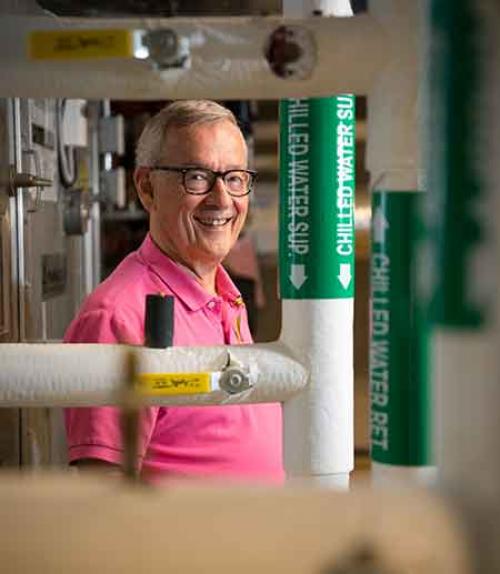The Cornell community is invited to celebrate the retirement of Henry Crans, director of facilities for the College of Arts and Sciences, after 50 years at Cornell. The drop-in reception will be on Tuesday, June 25, 1-4 pm in the Groos Family Atrium in Klarman Hall.
A stone in Henry Crans’ office sits emblazoned with the date 6/30/19, fifty years from the day he began working at Cornell.
In 1969 he was hired as a draftsman for Facilities Services; he retires at the end of this month as the director of facilities for the College of Arts & Sciences. In between, he diagnosed telephone systems and coordinated installation for Cornell’s telecommunications office, managed construction and projects for Facilities and Campus Services and served as manager of operational maintenance for all university buildings.
“For the last 40 years, Henry has watched over the College’s facilities with deep commitment and care,” said Ray Jayawardhana, the Harold Tanner Dean of Arts & Sciences. “He’s handled the countless problems that have come his way with a matter-of-fact attitude that reduces insurmountable obstacles to mere rough spots on the road. We have been lucky to have him.”
When Crans applied for the director of facilities position in the College of Arts and Sciences in 1979, he was the No. 2 candidate. Luckily for Crans, the No. 1 candidate turned it down. “He thought it was too political,” Crans said with a smile. “But I love this job.”
As facilities director Crans has had plenty of practice serving as diplomat and strategist, moving departments and entire building populations around during renovations. When slide projectors were replaced by modern audiovisual equipment, issues of line-of-sight for the A/V required him to move Kaufman Auditorium into the original Temple of Zeus location. The plaster cast statues in the cafe had to be disassembled before they could be moved, but to do that the statues’ joints had to be identified. Crans borrowed a portable x-ray machine from the College of Veterinary Medicine and he x-rayed every joint. The statues were successfully moved to 172 Goldwin Smith where they are still on display.
“Henry has an exceptional amount of institutional knowledge,” said Dave Taylor, associate dean for administration. “Combine that with his calm demeanor, common-sense approach and broad facilities expertise and you will begin to see what a genuinely vital role he has played in supporting the college for decades. He will be missed.”
Crans knows where the bodies are (or were) buried – literally – like the elephant head that a zoology professor interred under the Arts Quad. The professor had acquired it from a local circus and wanted to de-flesh it to study the skull. “Legend has it that it was buried in the floor of McGraw Hall,” said Crans, “but McGraw had a concrete floor so he had to bury it in the Quad instead.”
Another long-buried object was rescued by Crans after nearly 80 years of obscurity: a second century mosaic given as a gift by Princeton University researchers to Cornell colleagues that was never unpacked. Crans arranged for the 800-pound mosaic to be restored by local art conservator Kasia Maroney and, with support from the College of Arts & Sciences, put on display in the Groos Family Atrium in Klarman Hall. Crans considers this one of the “crowning achievements” of his time at Cornell.
Overseeing huge construction projects like Klarman Hall and the Physical Sciences Building were major achievements for Crans as well. Even with smaller projects, though, he was often the man on the spot when something went wrong – like the fistfight over a parking space for a dumpster he had to break up between contractors working on the addition to the Space Sciences Building and a new auditorium for Rockefeller Hall.
Crans is a veteran of Vietnam, where he served as crew chief for a C-130 airplane, providing support for combat operations. At Plattsburgh Air Force Base, he had to park planes at as much as 42 degrees below zero.
One lesson Crans said he has learned over the years is “not to take it personally. People always want someone to blame, but sometimes, things are just an accident.”
In addition to his facilities duties, Crans has long been an instructor for Cornell’s Outdoor Education Program, teaching mountain climbing, cross-country skiing and day hiking. He is known for his “Hidden Garden” tours around campus and for his “car camping for dummies” training. He was recently re-certified to teach rock-climbing after he retires. To honor his leadership, Outdoor Education named a van after him, putting “Henry” on the license plate.





